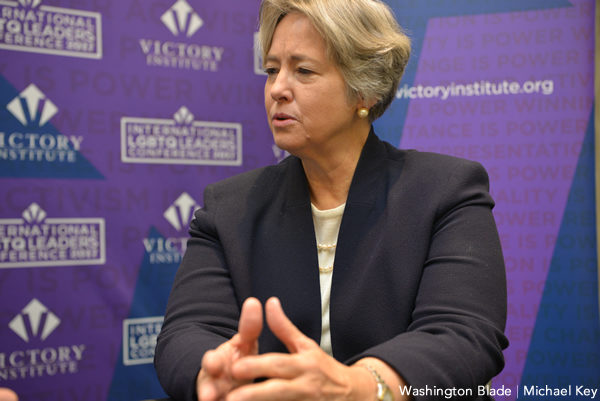National
Annise Parker on leading Victory Fund: ‘My focus is on the candidate’
“Trump is not the embodiment of the Republican Party for a lot of people.”
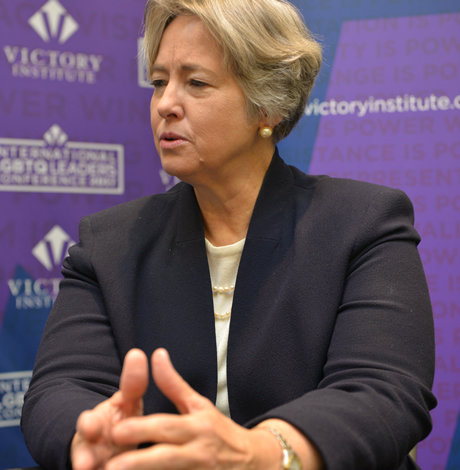
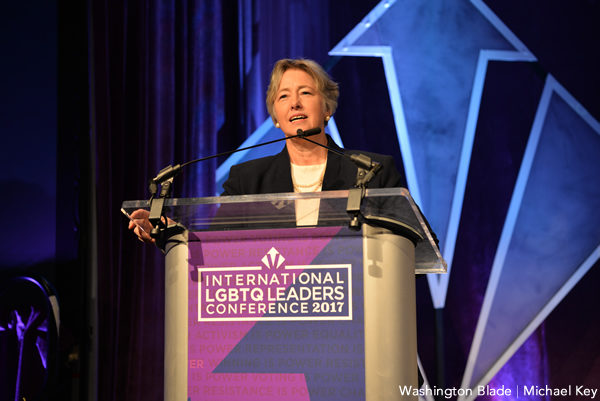
Annise Parker is now CEO of the Gay & Lesbian Victory Fund and Institute. (Washington Blade photo by Michael Key)
After more than 40 years of activism and three terms as mayor of Houston, Annise Parker has taken on a new leadership role as CEO of the Gay & Lesbian Victory Fund and Institute.
The change in leadership for the organizations was announced Friday at the annual International LGBTQ Leaders Conference. Parker, 61, told the crowd times have changed since she began her activism in the 1970s, but too many LGBT people “still have to fear” many of the dangers LGBT people faced decades ago.
“We celebrate milestones,” Parker said. “My race was one. But when you’re checking off milestones, it means you have not reached the end of the journey, and we don’t reach the end of this journey until all those fears are swept away and until all of our communities — across the United States, across cultures, across ethnicities — everyone of us has an equal opportunity to succeed.”
In an interview with the Washington Blade on Friday at the conference, Parker said the focus of her work would be on supporting LGBT candidates ready to make a difference.
“But it’s not just about having candidates, it’s about making sure that those candidates are funded and the Victory Fund does a great job of vetting candidates,” Parker said. “You have to have a good candidate, but passion’s not enough. You have to demonstrate their viability, and their ability to be successful.”
Parker takes the reins of the Victory Fund and Institute after the organizations were led for two-and-a-half years by Aisha Moodie-Mills, whose tenure was marked by historic wins by transgender candidates in local races in 2017. Moodie-Mills has left the organization with the stated purpose of championing work as a progressive activist.
Based on her long history in the LGBT movement, Parker said she brings a “different mindset” than Moodie-Mills and will be focused on the candidates, not progressive activism.
“I bring a different energy, I bring a different focus. My focus is on the candidate, but that doesn’t mean that anything we’ve done has been wrong or misplaced or inappropriate,” Parker said. “We just bring different styles and interests.”
Parker said the Victory Fund and Institute would take on the Trump administration “whenever we feel it’s necessary,” but keep electing LGBT candidates as the focus.
“Because it’s clear that simply standing up and speaking out against President Trump doesn’t have an impact, the best way to blunt his ability to hurt us is to put people in office who can vote against his anti-gay policies,” Parker said.
Parker will stay in Houston as CEO of the Victory Fund and Institute, but plans to travel often for the organizations, and will regularly be in D.C. Her tenure as CEO begins Monday.
Read the full interview here:
Washington Blade: We’ve seen a lot of success with LGBT candidates in 2017, particularly with the transgender wins in local races. How do you plan on building on that success going forward?
Annise Parker: Being successful in political campaigns starts with the candidate, so we are just as proud of the turnouts for our candidate training, the expressions of interest from candidates all over the country in running out and seeking Victory Fund support, so continuing to tap into the passion that people have right now and helping channel that into the campaigns.
But it’s not just about having candidates, it’s about making sure that those candidates are funded and the Victory Fund does a great job of vetting candidates. You have to have a good candidate, but passion’s not enough. You have to demonstrate their viability, and their ability to be successful. And so, that process is an important piece.
But then, once you have the right candidate in right race, it’s about making sure they have the resources and I know a lot of what I’ll be focused on, as the board does, is making sure that our candidates have the funding they need.
What I’ve seen over this — not quite a year — now, but through 2017 is the energy across the country. LGBT candidates, candidates of color, candidates who are women who are stepping up saying, “Enough is enough.” I want to make a difference and I’m going to jump into races, and they’re not discouraged at all by the idea that it’s an uphill battle, or that from an objective perspective, doesn’t look like they can win there.
They’re in it to win, but they’re not afraid of losing. They want to get out there and make statements. It’s a great time to come and tap into that kind of energy.
So we’re going to do that, but the fundamentals of Victory Fund haven’t changed in a very long time.
Blade: I wanted to ask you about that because I know you talked in your speech about how hard it was to be part of an organization in 1975 compared to 2017.
Parker: Different and it’s not different.
We have made tremendous progress, but if you look at when I was an activist in the 70s and 80s, I used to debate homophobes all the time, and they used to talk about the gay agenda. Remember the gay agenda? And I used to laugh and say there was no gay agenda.
Over time, I finally realized that there was a gay agenda, and the gay agenda is fairly straight forward. We want to be able to go to school without being bullied, we want to be to work at jobs we love and earn a paycheck so we can pay taxes to this country, we want to be able to serve openly in the military, we want to be able to walk down any street in America in safety, we want to be able to marry the people we love, we want to be able to adopt and raise children. That’s the GLBT agenda.
Many of those things we have achieved, but what we see now is how easily they can be swept away when we have the wrong person in the White House and the wrong attitude in Congress. So we made progress, but we can take this giant step back if we don’t keep our eyes focused on moving forward.
Blade: But what I wanted to get at there is do you think it’s simply enough for candidates to be out about their sexual orientation and gender identity, or is there something more that’s needed in 2017 in order to make an impact?
Parker: Yes and no.
It’s not enough to be a gay candidate. You have to be good at what you do. We have high expectations for our candidates, and that’s why we vet them, it’s why we look closely at their viability and the races they’re in. Not everybody who seeks a Victory Fund endorsement gets that Victory Fund endorsement.
But are we sending them out to be activists? No. We are sending them out to be who they are and represent their constituents and do the job they’ve been elected to do because when they do that, they make the really profound changes that we need to see that have been so transformative in America.
This latest anti-trans movement really, I think, unfortunately, wasn’t launched in Houston, but our HERO campaign [the 2015 campaign to preserve the Houston Equal Rights Ordinance] was where it really flowered. We had right-wing groups from all over the country, pouring money and resources in Houston. We had the right-wing ideologues coming through, the Mike Huckabees and Ted Cruzes coming though Houston and doing trans-bashing in Houston, and then they took it on the road to North Carolina and back to Texas with the statewide bathroom bill.
The difference in my more than 40 years of activism: No one in America can say they know no person who is gay or lesbian. Whether it’s simply they say, “Well, I know Ellen on TV,” whatever it is, they know someone, and very, very few people in America today can say they don’t know anyone, either in their family or their community who is gay.
But for too many Americans, transgender issues are unknown. They don’t know someone who is transgender; they don’t understand what the issues are, and they make them the other. And a lot of what we’re seeing is the arguments are the same arguments they used against us — us meaning the gay and lesbian part of the LGBT community — against the transgender community. Today, it’s the same arguments just slightly repackaged, but it’s all about taking something that is unknown and that you can create a fear around it and use it for either for political purposes or economic purposes.
And so, what is going to be so powerful, just as it took us a long time to get there for the gay and lesbian community, but this is a different era, and I think we’re going to make much faster progress, but what it’s going to take is our transgender brothers and sisters to get out there and speak for themselves, to go out as candidates and raise awareness.
And again, they don’t have to carry the flag for the community. They have to be out and they have to do a good job, and that’s what changes hearts and minds.
Blade: Let’s talk about the Victory Institute. Where do you envision that going as an organization, particularly the robust international program?
Parker: I started by saying the focus is on the candidates. We can’t win races if you don’t have the candidates, and that is the Victory Institute.
But we all understand we can turn this negative tide that’s coming out of Washington, we can firmly secure our rights here in America and we have to realize that agenda that I outlined, that still has to be won in all of these other countries around the world, and that we have a responsibility from our positions of relative privilege to make sure to support people who are doing the seminal work in those countries. It’s not about America; it’s about the LGBT community.
And some of the most horrific problems are going on in other places. When I was mayor of Houston, Houston has a huge international focus and I did a lot of trade missions. And everywhere I went, I made a practice of meeting with local LGBT leaders and women’s organizations, so I have met with lesbians in South Africa and transgender women in Indonesia, India and Brazil.
The tip of the spear right now is transgender issues. Their courage particularly in countries where it’s not — they’re not worried about walking down the street and having someone say something rude to them, they’re worried about walking down the street and having someone kill them. And we have to make sure that we stand together with them.
Blade: The anti-LGBT policies of the Trump administration are ongoing. To what extent will the Victory Fund and the Institute tackle that?
Parker: As an organization, our focus is on supporting candidates, but we are advocates for LGBT rights and issues, so with the other organizations in this space, we’ll stand up whenever we feel it’s necessary, but we also believe that the best way to blunt that — because it’s clear that simply standing up and speaking out against President Trump doesn’t have any impact, the best way to blunt his ability to hurt us is to put people in office who can vote against his anti-gay policies.
What I’ve seen over the last year, I actually did some extensive polling in Houston for other purposes, people in an odd way, they see Trump as a one-off. Trump is not the embodiment of the Republican Party for a lot of people. I know we like to think that that’s the case, those of us who are Democrats probably think that’s the case and we’re going to use that to demonize him, which doesn’t take much work, and use that to run. It’s not enough.
He’s Donald Trump, and there’s a core following that he has, but for most Americans, whether they love him or hate him, he’s over there, he’s a one-off, and it doesn’t translate into other down-ballot races.
Blade: That’s kind of what I wanted to get at with your vision for the Victory Fund and Institute. Would you say that they’re progressive organizations, or do they seek to advance LGBT people, LGBT rights regardless of political affiliation or ideology?
Parker: So that’s a really interesting question.
It’s clear that Aisha Moodie-Mills is very much a part of the progressive movement. I like to consider myself there as well, but as an organization our focus is completely bipartisan and it is about finding capable, qualified LGBT candidates, helping them get elected.
Now, capable and qualified, someone who’s LGBT but is ashamed of it, someone who’s LGBT and actively supports anti-gay legislative initiatives, we would not support that kind of candidate. So does that make us a progressive organization?
We also build alliances. Many of our candidates are pro-choice, they have progressive political agendas and they build coalitions in order to get elected. It’s not as if there’s any place in America — well, maybe West Hollywood, who knows — where we are a majority, so it requires us to build coalitions.
And our LGBT candidates are masters of putting together strong coalitions across racial and ethnic lines, with labor, with environmental organizations and voters in order to put a winning package together, so by that definition, we are absolutely a progressive organization, but that’s not our focus.
Blade: Would you say you’d have a different approach than Aisha going forward, or is it building off what she did?
Parker: I think we have to reflect what’s happening in the world around us as an organization. I’m a generation of activists older than she. I have children older than she is — adopted children, children nonetheless — and I bring a different mindset.
I was an activist in the 70s and I have seen the changes and sort of the arc of our history. I bring a different energy, I bring a different focus. My focus is on the candidate, but that doesn’t mean that anything we’ve done has been wrong or misplaced or inappropriate. We just bring different styles and interests, and as I said, we have to have coalitions to get elected. Maybe someday the right will offer us opportunities for coalition building, but today all of our coalitions are going to be on the left and in progressive communities because the right has become so virulently anti-gay.
There are gay elected officials here who are Republicans and so stand up proudly within their party and never waver on our issues, and we need more of that.
Blade: In the past, the Victory Institute has sought to appoint LGBT people to the U.S. government. Will the Victory Institute continue that within the Trump administration? I’m aware of four Trump appointees who are LGBT. Would the Victory Institute support them?
Parker: Our goal is to put people into office where they can make a difference. It’s not very fertile ground to plow, but that doesn’t mean we’re not going to try to plow it.
Blade: And will you continue to support Republican candidates who are LGBT?
Parker: Yes. But they have to, obviously, support, as I have outlined, the LGBT agenda.
It’s not about political party, it’s about making sure we have candidates who can advocate, or just being present. There are times when I was in office in the 18 years that I was in office that I had to stand up and articulate LGBT issues, but I think I was just as effective those times when I was simply there with my wife and making sure that they had to deal with me on human basis.
And if you talk to the office holders in the room, you’ll find out that they all have those kinds of stories where they’ve managed to change the trajectory of a bill or made inroads in some way simply because they were there and fully present in all aspects of their life.
Blade: Let’s talk about the approach to the candidates Victory Fund endorses. I think one big issue, and you talked about this in your speech, is religious freedom and the tension that has with LGBT rights, rightly or wrongly.
Parker: No one has a right to discriminate against me. I mean, that’s what RFRA bills are. The right to discriminate. If you are given the right to discriminate against me because I’m gay or because I’m transgender, why is that any different from you having to discriminate against someone who happens to be black or who happens to be a religion you don’t agree with. We have to fight against these bills.
Blade: But what would be your advice to candidates who are confronted with this? I remember when you were mayor of Houston, this became an issue with the subpoena of the sermons and there was this big argument that was infringing upon these pastors’ religious liberty.
Parker: There was a big argument. It happened without me knowing about it. I didn’t think it was wrong, but I rescinded it simply because it created too much of a peripheral issue. But that had to do with litigation around HERO. It wasn’t anything to do with RFRA or the ability to discriminate. That actually was around the litigation.
Blade: But what would be your advice to candidates who are confronted by those who say your views are an assault on religious liberty?
Parker: We are all Americans, and one of the bedrock values of America is that we treat each other fairly and decently and that everyone should be afforded the full rights of being an American.
We have fought wars against people who targeted minority populations. In World War II, millions of Americans died to fight an enemy that was specifically targeting Jews, Gypsies and LGBT people. It is fundamentally un-American. It took us a long time to get it right. We had to go through segregation, but it is fundamentally un-American to say I don’t like you, I’m not going to serve you. Once you allow someone to do that, it’s impossible to draw the line again.
Blade: One other thing I wanted to ask you about, we mentioned the Trump administration, I’m very curious as to what your take is on the massive hurricanes we had in recent months and Houston was devastated by Hurricane Harvey. How would you evaluate the administration’s handling of the response?
Parker: And I had a great deal of fun with Ann Coulter and my hurricane weather control abilities.
His response to the hurricane?
Blade: How would you evaluate that?
Parker: Inadequate across the board, but mediocre in Texas and in Florida and absolutely embarrassing in Puerto Rico and the U.S. Virgin Islands.
Blade: Why do you think there’s that discrepancy?
Parker: I think it’s all about his voting base. In Texas we’re also fighting against an incompetent state government that is not fully funding the recovery.
And this is my opinion. I’m not going to speak for the Victory Fund here because this is far afield of that. But having been an elected official at the local level, the Bush 43 administration learned after Katrina, and the Obama administration absolutely, Texas, Republican leadership, Rick Perry — I had a great working relationship with Rick Perry — they understood what was needed to recover from those kinds of storms, and you saw that in Sandy.
Now I think we have an administration that fundamentally doesn’t understand the role of the federal government in disaster recovery, doesn’t want to spend money on people who aren’t part of the president’s voting base and have had a tremendous amount of turnover in those positions, so actually have lost the expertise to know what to do, so it’s a three-fer, and it’s causing tremendous problems.
Texas voted for Trump.
Blade: Houston did not, though.
Parker: Houston did not. The big cities across Texas are all Democratic islands in a big, red sea, but Texas voted for Trump. 20 percent of the refining capacity is in Houston or just on the border of the city of Houston. You would think from a strategic standpoint that he’d be focusing on making sure that there’s a complete recovery across the energy industry base down there, but it’s not happening.
And Puerto Rico? They don’t vote. It’s an afterthought.
Blade: I want to go back to Texas and talk about Pigeon v. Turner. [A case in which the Texas Supreme Court questioned whether the Obergefell ruling guarantees same-sex spousal to city employees. The U.S. Supreme Court refused to review the decision of the Texas Supreme Court, which remanded its findings to lower state court.]
Parker: Actually, it was Piegon v. Parker. It’s referred to both ways, but yeah.
Blade: You mentioned that in your speech. How concerned are you about that litigation?
Parker: When you track what happened, the state Supreme Court refused to intervene, and then the lieutenant governor of the state of Texas, the governor and the right-wing leaders across the state put pressure on the elected state Supreme Court, and they re-evaluated and then sent it back down to the appellate court.
It’s transparent to everybody in the state that they bowed to political pressure. That said, the argument being made by the right is that the Supreme Court says you can have marriage, but you can’t have benefits. There’s no right to benefits. Well, that’s absurd. Ultimately, if we get all the way up to the U.S. Supreme Court, they’ll straighten it out.
But from a practical standpoint, even if we lose Pigeon v. Parker, Pigeon v. Turner, even if the city of Houston loses, there’s no impact because the mayor of Houston is going to continue to offer benefits. They possibly have a pyrrhic victory which says no you don’t have to offer benefits, and well say, no, we don’t have to offer them but we’re going to. Mayor Turner’s clear on that and we’ll go forward.
But I have no faith in the Texas Supreme Court. In fact, we have several really great candidates running statewide. One of our LGBT candidates is a local elected judge who’s running for the state Supreme Court for precisely this reason, that they are making these kinds of political decisions. But there’ll be no practical impact from it.
Blade: My last question is as someone how has been part of the movement for so many years, how would you evaluate the LGBT movement now? Is it stronger than it was, or is it more anemic?
Parker: Yes and no.
It’s stronger in the sense there’s so many more people, it’s broader and deeper and it’s really reflective of the vast diversity of our community across America, but it’s weaker in only one sense. And that is that we have made gains and there a lot of folks who felt we can lay our burden down, no, we got this, it’s going to go in the right direction, I can go do other things, I don’t have to show up and vote every time, I don’t have to send money to all these organizations, I don’t have to protest or write letters or do this. Yes you do.
So on the whole it is much stronger, but it’s different and the issues evolve, and how we have to address those issues evolved. And I’ll just close with we had a vote on Houston’s non-discrimination ordinance.
And to be clear, because the media gets this wrong all the time, we had no non-discrimination ordinance. We didn’t decide to add gender identity and sexual orientation. We had zero ordinance. So we wrote a comprehensive ordinance that included everybody, and when the citizens of Houston voted it down, we don’t have an ordinance that protects black people in Houston.
Everything about the anti-HERO vote was about men in women’s bathrooms, but what was interesting is the average age of voters was 68 years old. If the average age of voter in the city of Houston election had been 50, we would have won. If the average age of voter had been 35, they would have laughed it off the ballot.
I think we’re going to win the war. In fact, we’ve already won the war, but we lose a lot of battles between now and then, and we can’t take our foot off the pedal. All of the things we’ve been doing for the last 45 years since Stonewall basically throwing ourselves into the political process, showing up, voting, protesting when necessary, we still have to keep doing it.
It’s extremely frustrating, the HERO vote because of the low turnout. And young people, you absolutely got it, but they have to vote.
Note: This interview has been edited for length.
Maine
Maine’s Governor Mills signs trans & abortion sanctuary bill into law
Despite a series of bomb threats against legislators in the state, Gov. Janet Mills has signed a trans & abortion sanctuary bill

By Erin Reed | AUGUSTA, Maine – On Tuesday, Gov. Janet Mills of Maine signed LD 227, a sanctuary bill that protects transgender and abortion providers and patients from out-of-state prosecution, into law.
With this action, Maine becomes the 16th state to explicitly protect transgender and abortion care in state law from prosecution. This follows several bomb threats targeting state legislators after social media attacks from far-right anti-trans influencers such as Riley Gaines and Chaya Raichik of Libs of TikTok.
An earlier version of the bill failed in committee after similar attacks in January. Undeterred, Democrats reconvened and added additional protections to the bill before it was passed into law.
The law is extensive. It asserts that gender-affirming care and reproductive health care are “legal rights” in Maine. It states that criminal and civil actions against providers and patients are not enforceable if the provision or access to that care occurred within Maine’s borders, asserting jurisdiction over those matters.
It bars cooperation with out-of-state subpoenas and arrest warrants for gender-affirming care and abortion that happen within the state. It even protects doctors who provide gender-affirming care and abortion from certain adverse actions by medical boards, malpractice insurance, and other regulating entities, shielding those providers from attempts to economically harm them through out-of-state legislation designed to dissuade them from providing care.
You can see the findings section of the bill here:
The bill also explicitly enshrines the World Professional Association of Transgender Health’s Standards of Care, which have been the target of right-wing disinformation campaigns, into state law for the coverage of transgender healthcare:
The bill is said to be necessary due to attempts to prosecute doctors and seek information from patients across state lines. In recent months, attorneys general in other states have attempted to obtain health care data on transgender patients who traveled to obtain care. According to the United States Senate Finance Committee, attorneys general in Tennessee, Indiana, Missouri, and Texas attempted to obtain detailed medical records “to terrorize transgender teens in their states… opening the door to criminalizing women’s private reproductive health care choices.”
The most blatant of these attempts was from the Attorney General of Texas, who, according to the Senate Finance Committee, “sent demands to at least two non-Texas entities.” One of these entities was Seattle Children’s Hospital, which received a letter threatening administrators with arrest unless they sent data on Texas patients traveling to Seattle to obtain gender-affirming care.
Seattle Children’s Hospital settled that case out of court this week, agreeing to withdraw its Texas business registration in return for Texas dropping its investigation. This likely will have no impact on Seattle Children’s Hospital, which has stated it did not treat any youth via telemedicine or in person in Texas; the hospital will be able to continue treating Texas youth who travel outside of Texas to obtain their care. That settlement was likely compelling due to a nearly identical law in Washington that barred out-of-state investigations on transgender care obtained solely in the state of Washington.
The bill has faced a rocky road to passage. A similar bill was debated in January, but after coming under intense attack from anti-trans activists who misleadingly called it a “transgender trafficking bill,” the bill was voluntarily withdrawn by its sponsor.
When LD 227 was introduced, it faced even more attacks from Riley Gaines and Libs of TikTok. These attacks were followed by bomb threats that forced the evacuation of the legislature, promising “death to pedophiles” and stating that a bomb would detonate within a few hours in the capitol building.
Despite these threats, legislators strengthened both the abortion and gender-affirming care provisions and pressed forward, passing the bill into law. Provisions found in the new bill include protecting people who “aid and assist” gender-affirming care and abortion, protections against court orders from other states for care obtained in Maine, and even protections against adverse actions by health insurance and malpractice insurance providers, which have been recent targets of out-of-state legislation aimed at financially discouraging doctors from providing gender-affirming care and abortion care even in states where it is legal.
See a few of the extensive health insurance and malpractice provisions here:
Speaking about the bill, Gia Drew, executive director of EqualityMaine, said in a statement, “We are thrilled to see LD 227, the shield bill, be signed into law by Governor Mills. Thanks to our pro equality and pro reproductive choice elected officials who refused to back down in the face of disinformation. This bill couldn’t come into effect at a better time, as more than 40% of states across the country have either banned or attempted to block access to reproductive care, which includes abortions, as well as transgender healthcare for minors. Thanks to our coalition partners who worked tirelessly to phone bank, lobby, and get this bill over the finish line to protect community health.”
Destie Hohman Sprague of Maine Women’s Lobby celebrated the passage of the bill despite threats of violence, saying in a statement, “A gender-just Maine ensures that all Mainers have access to quality health care that supports their mental and physical wellbeing and bodily autonomy, including comprehensive reproductive and gender-affirming care. We celebrate the passage of LD 227, which helps us meet that goal. Still, the patterns of violence and disinformation ahead of the vote reflected the growing connections between misogyny, extremism, and anti-democratic threats and actions. We must continue to advocate for policies that protect bodily autonomy, and push back against extremist rhetoric that threatens our states’ rights and our citizens’ freedoms.”
The decision to pass the legislation comes as the Biden administration released updated HIPAA protections that protect “reproductive health care” from out-of-state prosecutions and investigations.
Although the definition of “reproductive health care” is broad in the new HIPAA regulations, it is uncertain whether they will include gender-affirming care. For at least 16 states, though, gender-affirming care is now explicitly protected by state law and shielded from out-of-state legislation, providing transgender people and those seeking abortions with protections as the fight increasingly crosses state lines.
****************************************************************************

Erin Reed is a transgender woman (she/her pronouns) and researcher who tracks anti-LGBTQ+ legislation around the world and helps people become better advocates for their queer family, friends, colleagues, and community. Reed also is a social media consultant and public speaker.
******************************************************************************************
The preceding article was first published at Erin In The Morning and is republished with permission.
State Department
State Department releases 2023 human rights report
Antony Blinken reiterates criticism of Uganda’s Anti-Homosexuality Act

WASHINGTON — Secretary of State Antony Blinken on Monday once again reiterated his criticism of Uganda’s Anti-Homosexuality Act upon release of the State Department’s annual human rights report.
“This year’s report also captures human rights abuses against members of vulnerable communities,” he told reporters. “In Afghanistan, the Taliban have limited work opportunities for women, shuttered institutions found educating girls, and increasing floggings for women and men accused of, quote, ‘immoral behavior,’ end quote. Uganda passed a draconian and discriminatory Anti-Homosexuality Act, threatening LGBTQI+ individuals with life imprisonment, even death, simply for being with the person they loved.”
Ugandan President Yoweri Museveni last May signed the law, which contains a death penalty provision for “aggravated homosexuality.”
The U.S. subsequently imposed visa restrictions on Ugandan officials and removed the country from a program that allows sub-Saharan African countries to trade duty-free with the U.S. The World Bank Group also announced the suspension of new loans to Uganda.
Uganda’s Constitutional Court earlier this month refused to “nullify the Anti-Homosexuality Act in its totality.” More than a dozen Ugandan LGBTQ+ activists have appealed the ruling.
Clare Byarugaba of Chapter Four Uganda, a Ugandan LGBTQ+ rights group, on Monday met with National Security Council Chief-of-Staff Curtis Ried. Jay Gilliam, the senior LGBTQI+ coordinator for the U.S. Agency for International Development, in February traveled to Uganda and met with LGBTQ+ activists who discussed the Anti-Homosexuality Act’s impact.
“LGBTQI+ activists reported police arrested numerous individuals on the basis of their sexual orientation or gender identity and subjected many to forced anal exams, a medically discredited practice with no evidentiary value that was considered a form of cruel, inhuman, and degrading treatment and could amount to torture,” reads the human rights report.
The report, among other things, also notes Ugandan human rights activists “reported numerous instances of state and non-state actor violence and harassment against LGBTQI+ persons and noted authorities did not adequately investigate the cases.”
Report highlights anti-LGBTQ+ crackdowns in Ghana, Hungary, Russia
Ghanaian lawmakers on Feb. 28 approved the Promotion of Proper Human Sexual Rights and Ghanaian Family Values Bill. The country’s president, Nana Akufo-Addo, has said he will not sign the measure until the Ghanaian Supreme Court rules on whether it is constitutional or not.
The human rights report notes “laws criminalizing consensual same-sex sexual conduct between adults” and “crimes involving violence or threats of violence targeting lesbian, gay, bisexual, transgender, queer or intersex persons” are among the “significant human rights issues” in Ghana.
The report documents Hungarian Prime Minister Viktor Orbán and members of his right-wing Fidesz party’s continued rhetoric against “gender ideology.” It also notes Russia’s ongoing crackdown against LGBTQ+ people that includes reports of “state actors committed violence against LGBTQI+ individuals based on their sexual orientation or gender identity, particularly in Chechnya.”
The report specifically notes Russian President Vladimir Putin on July 24 signed a law that bans “legal gender recognition, medical interventions aimed at changing the sex of a person, and gender-affirming care.” It also points out Papua New Guinea is among the countries in which consensual same-sex sexual relations remain criminalized.

The Cook Islands and Mauritius in decriminalized homosexuality in 2023.
The report notes the Namibia Supreme Court last May ruled the country must recognize same-sex marriages legally performed outside the country. The report also highlights the Indian Supreme Court’s ruling against marriage equality that it issued last October. (It later announced it would consider an appeal of the decision.)
Congress requires the State Department to release a human rights report each year.
The Biden-Harris administration in 2021 released a memorandum that committed the U.S. to promoting LGBTQ+ and intersex rights abroad.
The full report can be read here.
Florida
Gov. DeSantis denounces ‘weaponization’ of book challenges
‘They’re going to be holding many teachers accountable,’ he said signing a bill restricting nonparents to 1 book challenge per month

By Michael Moline | TALLAHASSEE, Fla. – The DeSantis administration plans to punish teachers and principals deemed to be exploiting public school book challenges to, in the governor’s view, “weaponize” Florida’s parental rights laws.
DeSantis leveled that charge Monday during a news conference in Pensacola. On Tuesday, he raised it again during a second news conference in Jacksonville, where he signed legislation restricting nonparents to one book challenge per month.
The challenges come under state law allowing anyone to complain about the content of classroom materials they deem objectionable or pornographic. The laws require removal of challenged books pending reviews that can take considerable time. DeSantis began trying to tone down the situation in February, in advance of the 2024 legislative session.

“Manny, in the Department of Education, they’re going to be holding many principals or teachers accountable who are weaponizing this,” DeSantis said Tuesday, referring to Education Commissioner Manny Diaz Jr.
DeSantis cited Sarasota County teachers who “papered over every book in the classroom, saying, ‘Oh! You can’t have books! The state’s not letting me show you books! That’s a lie. That’s not true. That’s performative.
“And so, that’s somebody who’s entrusted to teach kids putting their political agenda over the best interests of the students’ education and their access to learning. That’s wrong; that’s not going to stand in the state of Florida. So, we don’t have time for your activism; we don’t have time for your nonsense. We have a process in place to empower parents,” the governor said.
Teachers told the Sarasota Herald Tribune in January 2023 that they feared prosecution if they put students in contact with unvetted books.
The Phoenix asked the administration for an explanation of any investigations launched or punishment inflicted on school employees but hasn’t heard back yet.
Rebuttal
Florida Education Association President Andrew Spar issued a rebuttal in the form of a written statement.
“It’s important to remember that Gov. DeSantis’ full throated support is the reason why fringe groups who do not represent the majority of Floridians and often do not have students in the classroom have felt so comfortable removing books off shelves and making Florida the leader in the nation on book banning,” Spar said.
“This rule does nothing to fix the vague language that caused the issue in the first place, no matter how much the Governor and Commissioner Manny Diaz try to shift blame. Schools, teachers, and media specialists have long been asking for guidance on this issue and once again, instead of providing students what they need, Florida’s elected and appointed officials decide to play the blame game instead of taking responsibility,” Spar continued.
The American Library Association has reported that the bulk of the book challenges nationally come from conservatives.
“Recent censorship data are evidence of a growing, well-organized, conservative political movement, the goals of which include removing books about race, history, gender identity, sexuality, and reproductive health from America’s public and school libraries that do not meet their approval,” the association says in a written statement on its website.
“Using social media and other channels, these groups distribute book lists to their local chapters and individual adherents, who then utilize the lists to initiate a mass challenge that can empty the shelves of a library,” the association continues.
Florida saw 2,672 titles challenged during 2023, it says.
Meanwhile, PEN America recorded 1,406 book ban cases in Florida during the 2022-2023 school year, which accounted for 40% of the national total.
One challenge per customer
The new law (HB 1285) restricts challenges by people without children in a school district to one per month, while parents and guardians remain free to issue unlimited challenges.
That would still allow 12 challenges by nonparents per year, Diaz observed during Tuesday’s news conference. However, “Anyone who creates a cottage industry of going around the state and just creating challenges just to gunk up the system and put schools in arrears as far as reviewing these books, that person won’t be able to do it anymore,” Diaz said.
DeSantis complained that the news media have inflated challenges against classic books and biographies of important Americans while playing down other materials, including LGBTQ content, that he considers unsuitable for young kids or even pornographic.
“They’ve said, ‘Oh, you know, you’re not having Rosa Parks’ — and yet that’s on the summer reading list. Things about Hank Aaron, a book of the month from the Department of Education. So that’s clearly a bad-faith challenge, just trying to create a narrative,” DeSantis said.
“Some of those bad-faith actions have been done from people within the school system who are doing that to try to create a narrative. So, Manny will be able to hold those folks accountable because clearly there’s nothing in Florida law that would tell you to do that,” he continued.
Spar observed: “What Gov. DeSantis and Commissioner Manny Diaz always seem to forget when they attack public schools is that they have failed public schools through their punitive policies that have worsened the teacher and staff shortage and kept teacher and staff pay low. It is clear their political agenda is more important than the needs of Florida’s students.”
**************************************************************************************

Michael Moline has covered politics and the legal system for more than 30 years. He is a former managing editor of the San Francisco Daily Journal and former assistant managing editor of The National Law Journal.
**************************************************************************************
The preceding article was previously published by the Florida Phoenix and is republished with permission.
The Phoenix is a nonprofit news site that’s free of advertising and free to readers. We cover state government and politics with a staff of five journalists located at the Florida Press Center in downtown Tallahassee.
We’re part of States Newsroom, the nation’s largest state-focused nonprofit news organization.
Louisiana
Louisiana’s Superintendent of Education decries new Title IX rules
“The Title IX rule changes recklessly endanger students and seek to dismantle equal opportunities for females”
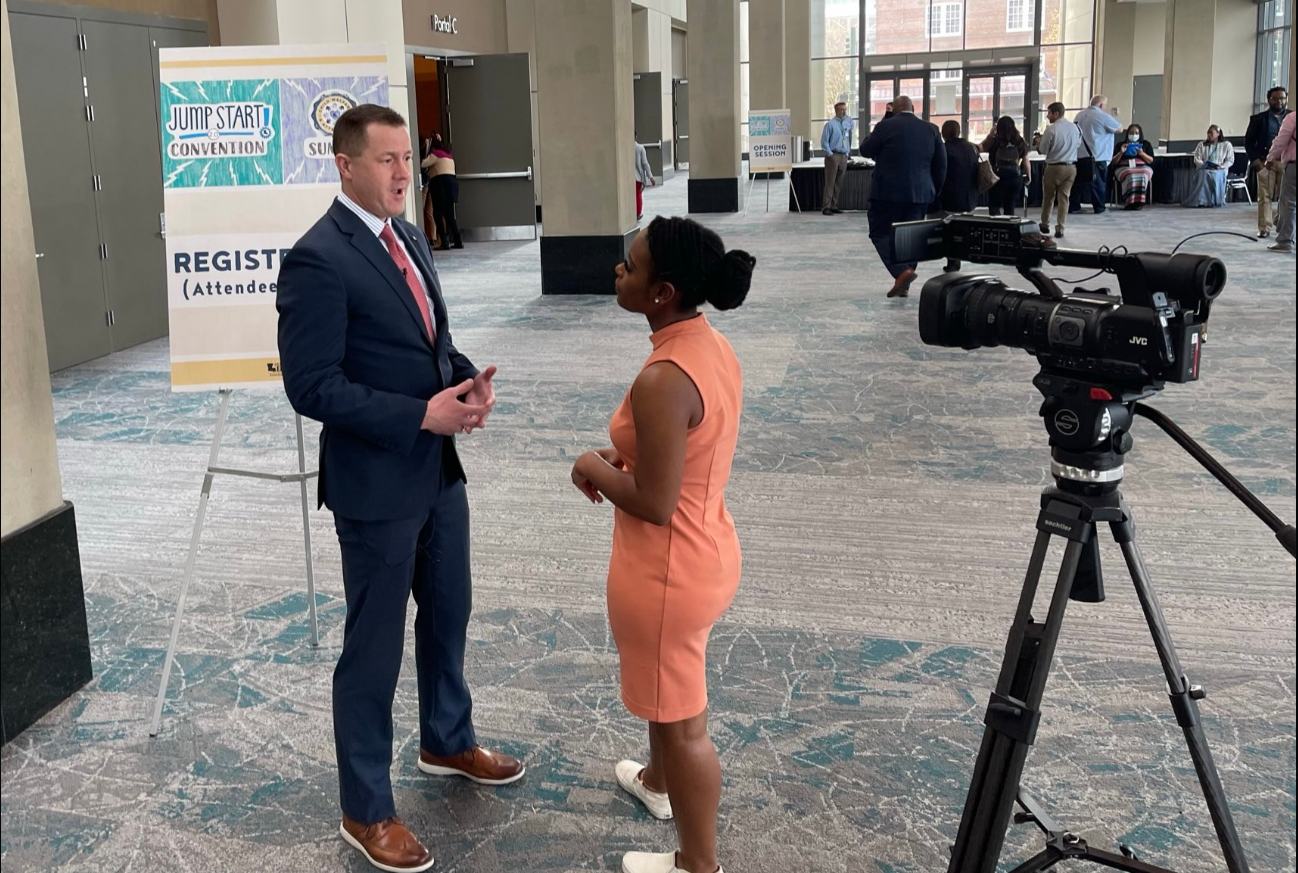
BATON ROUGE, La. – In a letter sent out Monday to all Louisiana school districts, state Superintendent of Education Cade Brumley warned that administrators should not comply with new federal rules that extend civil rights protections to LGBTQ+ students.
The Biden-Harris administration’s revised final rule of Title IX policy protects LGBTQ+ students from discrimination and other abuse was issued by the U.S. Department of Education last Friday.
While the new rule does not provide guidance on whether schools must allow transgender students to play on sports teams corresponding with their gender identity to comply with Title IX, the question is addressed in a separate rule proposed by the agency in April.
In his letter, reported by NOLA.com/The Advocate, Brumley said the federal rules, which take effect Aug. 1, would force schools to allow transgender girls to use girls’ restrooms and locker rooms. He also said the rules would compel teachers to call students by their preferred names and pronouns — a requirement that would appear to conflict with a bill in the Louisiana Legislature to protect teachers who refuse to refer to students by pronouns that don’t match their sex assigned at birth.
Brumley said he believes the rules would also conflict would a 2022 state law that bans transgender girls and women from participating on female sports teams at the K-12 school or college level, NOLA.com/The Advocate reported.
“The Title IX rule changes recklessly endanger students and seek to dismantle equal opportunities for females,” he wrote in the April 22 letter.
Restating his “staunch opposition” to the federal rules, Brumley said “it remains my position that schools should not alter policies or procedures at this time.”
Jennifer Klein, the director of the White House Gender Policy Council, said during a call with reporters Thursday that the administration sought to strike a balance with respect to these issues, “reaffirming our longstanding commitment to fundamental fairness.”
North Carolina
Raleigh N.C. Moms for Liberty panel touts anti-LGBTQ+ agenda
Panelists argued that public schools are trying to undermine parental rights and advocate for Critical Race Theory and “gender ideology”
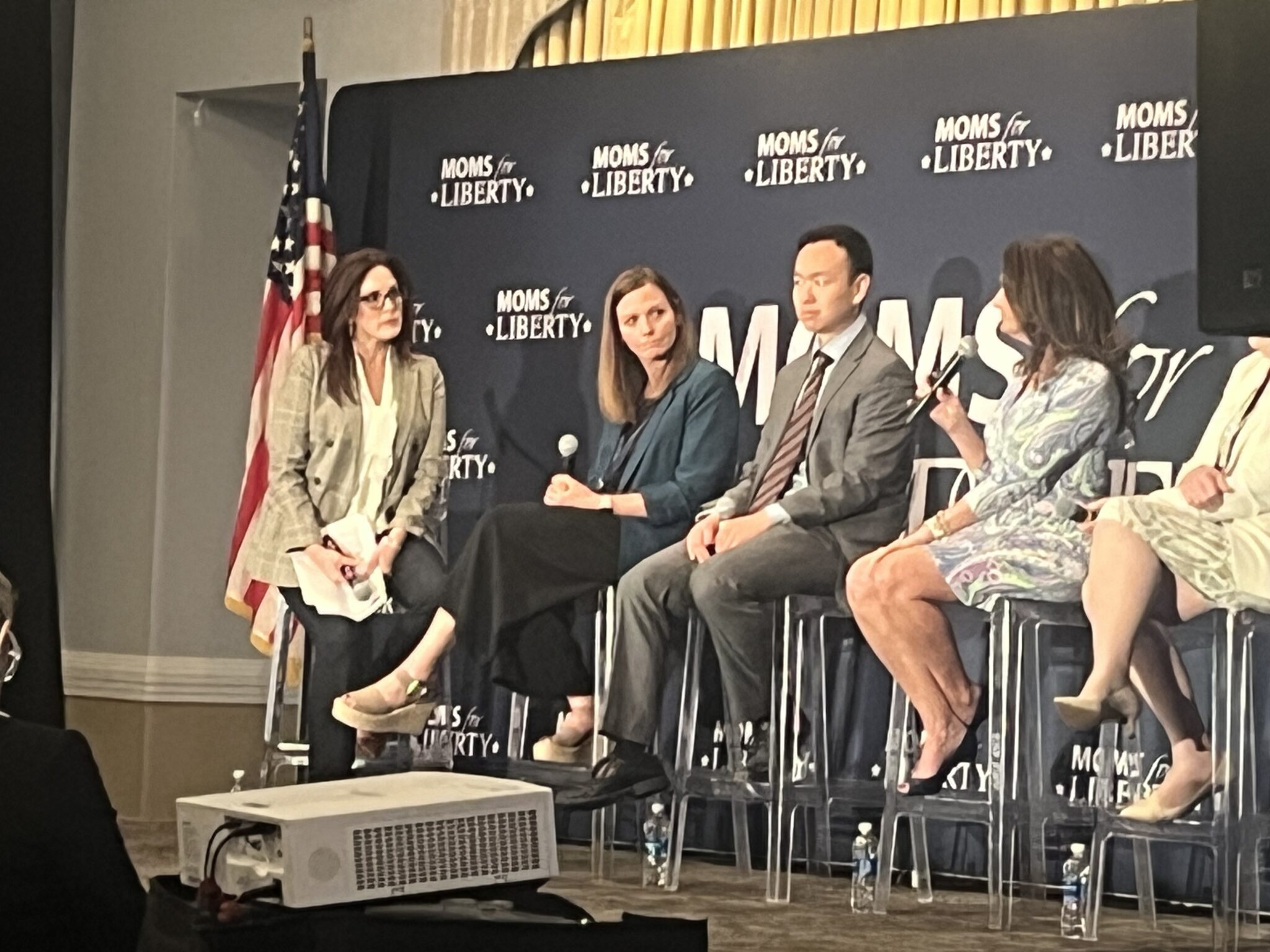
By Ahmed Jallow | RALEIGH, N.C. – At a town hall meeting in Raleigh on Wednesday night sponsored by the organization Moms for Liberty, national and local leaders of the conservative group blamed unsafe schools, among other reasons, as the cause for North Carolina teachers leaving the profession, rather than low pay.
Roughly 50 people attended the event, which featured the group’s co-founder Tiffany Justice and panelists, including local Moms for Liberty organizers and supporters. The North Carolina Republican Party’s nominee for Superintendent of Public Instruction, Michele Morrow attended the event but did not speak.
Moms for Liberty was founded in Florida in 2021 and gained prominence for its opposition to COVID-19 school closures and mask mandates.
It is now a national organization with chapters in 48 states, including 20 in North Carolina. The group has shifted its focus to curriculum content and calls for limitations on discussions of gender, sexuality, and DEI in schools. The group also calls for the removal of books they believe are inappropriate for certain age groups.
On Wednesday, former Union County Education Board Chair Melissa Merrell was hailed for her resistance to state officials’ efforts aimed at curbing the spread of COVID-19 in 2021. The school board’s decision in 2021 to do away with quarantines and contact tracing for students exposed to COVID-19 sparked controversy.
Merrell served on the school board from 2014 to 2022.
Merrell, who is now a Union County commissioner, claimed that new teachers replacing those lost to retirement and other factors are “indoctrinated” and that her county is being targeted. “The ones that are coming in have certainly been indoctrinated in their universities and their internships,” she said. “I truly believe that Union County has a target, that there is an agenda to change Union County. And so, they are moving in in mass droves.”
Mary Summa of the conservative NC Values Coalition credits State Rep. Tricia Cotham’s switch to the Republican Party as a turning point. “She saw the light and became a Republican,” Summa said. “It changed the game for us because we had an agenda that included a Pro-life bill, the Save Women’s sports bill which we tried for several years to get passed.”
Restorative justice practices prioritize making amends over punishment, but Moms of Liberty see this as one of the reasons for the rise in school violence. “What we’ve seen in schools across the United States and in North Carolina are programs and practices like restorative justice, which means kids aren’t being held accountable for their for their actions, there is no consequence for this type of behavior,” said Justice.
She cited a recent incident caught on social media at a Forsyth County high school. A student has been charged with misdemeanor assault and is facing expulsion after allegedly slapping a teacher in the face twice, according to the Winston-Salem Journal.
Throughout the discussion, panelists argued that public schools are trying to undermine parental rights and advocate for Critical Race Theory and “gender ideology.” Speakers called for schools to stop working with outside groups, such as educational nonprofits and health organizations.
“Our children are being taught to hate America, to hate the Christian values and the principles of liberty that America was founded upon …” said Abigail Prado, chair of Moms for Liberty’s Union County chapter. “Our children are not being educated. They are being indoctrinated.”
******************************************************************************************

Reporter Ahmed Jallow covers education as well as politics and elections
******************************************************************************************
The preceding article was previously published by the NC Newsline and is republished with permission.
NC Newsline is a Raleigh-based nonpartisan, nonprofit newsroom dedicated to fearless reporting and hard-hitting commentary that shines a light on injustice, holds public officials accountable, and helps improve the quality of life throughout North Carolina.
We’re part of States Newsroom, the nation’s largest state-focused nonprofit news organization.
Texas
Texas Governor Abbott: “We Want To End” trans teachers
Abbott announced in a keynote speech to the Young Conservatives of Texas an intention to “end” trans and GNC teachers being able to teach

By Erin Reed | DALLAS, Texas – During a session at the 2024 Young Conservatives of Texas Convention held at the Hilton Anatole in Dallas this weekend, Gov. Greg Abbott stated that trans and gender nonconforming (GNC) teachers must be “ended” in the state.
This statement follows crackdowns on transgender teachers in various Republican-controlled states in the United States. Book bans, “Don’t Say Gay” legislation, and anti-drag laws have increasingly been weaponized against all transgender and GNC individuals, especially within educational settings. In Texas, many of these laws have been blocked due to being likely unconstitutional; however, this has not prevented the governor from making one of his strongest statements yet in support of overt discrimination toward transgender people.
The statement, first reported by journalist Steven Monacelli, addresses a teacher in a small town in Texas. Abbott, who repeatedly refers to the teacher as a “man dressed as a woman,” states that the teacher’s mere presence “normalizes the concept” of being transgender or GNC—a concept Gov. Abbott then asserts the state should try to prohibit. He states, “This kind of behavior is something we need to end in the state of Texas.”
Abbott said:
“Up the street from where we are right now is Lewisville, Texas. In Lewisville, Texas, in the high school, recently, as in just a month ago, they had a high school teacher who was a man who would go to school dressed as a woman in a dress, high heels, and makeup. Now, what do you think is going through the mind of the students that’s in that classroom? Are they focusing on the subject that this person is trying to teach? I don’t know. What I do know are these two things. One is this person, a man, dressing as a woman, in a public high school in the state of Texas, he’s trying to normalize the concept that this type of behavior is okay. This type of behavior is not okay. And this is the type of behavior that we wanna make sure we end in the state of Texas.”
Within hours, multiple GOP officials in Texas signed onto Abbott’s call to ban trans and GNC teachers from teaching. These include Texas GOP Chair Matt Rinaldi and multiple Texas State legislators and candidates such as Briscoe Cain and Brent Money. Their reaction to Abbott’s comments are in line with the Texas GOP platform passed in 2022 that call extensive restrictions on trans and GNC individuals in schools.
It is important to note that federal law prohibits discrimination against LGBTQ+ people in the workplace. A Supreme Court decision, Bostock vs. Clayton County, specifically stated that Title VII protections around nondiscrimination in the workplace apply to trans and GNC people. That court decision is currently being used to overturn anti-trans laws in Title IX cases in schools as well as bathroom bans, sports bans, and more.
Recent efforts have targeted transgender and gender-nonconforming individuals within state school systems. For example, Florida’s “Don’t Say Gay” legislation was recently extended to apply to transgender teachers who share pronouns or use titles different from their sex assigned at birth. This law forced a transgender female teacher to go by Mr. and use he/him pronouns in the classroom or face termination. Similarly, a nonbinary teacher was banned from using the title Mx. in school.
A recent case in the 11th Circuit Court of Appeals, however, blocked that Florida law as likely in violation of the First Amendment. Like Governor Abbott, attorneys for the state of Florida argued that transgender teachers in the classroom were a “distraction” to students and that a trans woman teacher was harming her students’ education with her mere existence and expression of her identity. The judge, however, struck down this notion, noting that the trans woman teacher had higher test scores than the district average.
It remains to be seen whether Gov. Abbott and the Republican Party of Texas will lean into anti-trans politics going into the 2024 elections. The willingness of some influential Texas Republicans to endorse Gov. Abbott’s position in the video suggests that they might. If so, there is evidence that this could harm candidates who are in tight races in the state and espouse such positions. For instance, in 2023, candidates running on anti-trans issues experienced significant defeats nationwide, including the defeat of 70% of all Moms For Liberty candidates in school boards.
Regardless of electoral consequences, the state has become harsher for transgender people in recent years. Attorney General Ken Paxton has continued to subpoena medical records of transgender individuals who cross state lines to obtain care. He has also attempted to obtain lists of PFLAG members, including addresses and phone numbers.
Abbott has not been much better: under his leadership, transgender families across the state were investigated under the premise that providing medical care for their transgender youth amounted to child abuse. This latest statement from Gov. Abbott shows an intent to continue weaponizing state powers against transgender and gender-nonconforming people in Texas.
****************************************************************************

Erin Reed is a transgender woman (she/her pronouns) and researcher who tracks anti-LGBTQ+ legislation around the world and helps people become better advocates for their queer family, friends, colleagues, and community. Reed also is a social media consultant and public speaker.
******************************************************************************************
The preceding article was first published at Erin In The Morning and is republished with permission.
U.S. Federal Courts
Okla. trans bathroom law appealed after federal judge dismisses it
One of the defendants was state Superintendent Ryan Walters, the most vocal advocate of outlawing school bathroom use by gender identity

By Nuria Martinez-Keel | OKLAHOMA CITY, Okla. – A lawsuit challenging an Oklahoma law affecting transgender students’ use of school restrooms has been appealed after being dismissed in Oklahoma City federal court.
The families of three transgender students sued the Oklahoma State Department of Education in 2022 to overturn Senate Bill 615, which they said is unconstitutional and a Title IX violation.
SB 615 required school restrooms to be used according to a person’s biological sex, not their gender identity. A single-occupant restroom also must be available as an alternative.
On Friday, the American Civil Liberties Union of Oklahoma appealed U.S. District Judge Jodi W. Dishman’s decision to throw out the lawsuit. Last month, Dishman fully dismissed the case with prejudice, meaning it cannot be refiled.
The dismissal was “mildly surprising” because it means the judge didn’t just disagree, but found the plaintiffs’ claims to be meritless, said Devraat Awasthi, an ACLU legal fellow working on the case.
The ACLU of Oklahoma has appealed Dishman’s decision to the Tenth Circuit Court of Appeals.
“SB 615 is a law that elevates the privacy and safety interest of cisgender students above those of transgender and nonbinary students, and that violates the Constitution’s promise of equality under the law,” Awasthi said. “That’s a promise that all Oklahomans care about, and I think that we are vindicating that important commitment by bringing this appeal.”
Dishman ruled in favor of the state Attorney General’s Office, who contended treatment based on gender identity doesn’t amount to sex discrimination under Title IX.
The three plaintiffs don’t present a danger to fellow students, the judge wrote in her court order, but she decided striking down the law could create a safety issue.
“If the Court adopted Plaintiffs’ position, any biological male could claim to be transgender and then be allowed to use the same restroom or changing area as girls,” Dishman wrote. “This is a major safety concern.
“However, if Plaintiffs’ arguments were adopted, it would put school officials in the position of either having to conduct a subjective analysis of the sincerity of an individual’s gender identity or merely take their word for it.”
The Attorney General’s Office declined to comment on the case.

One of the defendants was state Superintendent Ryan Walters, the head of the state Education Department. He has been one of the most vocal advocates of outlawing school bathroom use by gender identity, saying it puts female students at risk.
“The (U.S.) District Court was correct in recognizing the real physiological differences between men and women, and the real interest of parents in protecting their kids,” Walters said in a statement. “Oklahomans strongly oppose the radical left trying to force young girls to share bathrooms with boys, and I will always fight to protect our students.”
Walters also has been a supporter of Oklahoma laws that prohibit gender-affirming medical care for minors and that block transgender girls from playing in women’s sports. He pursued new rules at the Education Department to prevent students from retroactively changing prior school records to match their gender identity.
Laws like these embolden bullies and put transgender students at risk, Awasthi said.
He pointed to the death of Nex Benedict, a nonbinary student from Owasso who had reported bullying. A medical examiner’s report found Benedict, 16, died by suicide on Feb. 8, a day after the student was in a fight in a school restroom.
“I think an important facet of laws like this in general is it gives cover to bullies and to bigots in our society because it makes them think their kind of discriminatory intent is supported by the state,” Awasthi said. “It kind of gives almost permission for that kind of horrible treatment to occur in our public schools.”
Walters called this argument around Benedict’s death a “grotesquely distorted radical, progressive, Democrat narrative” in a Fox News opinion piece he published on Thursday. Walters’ editorial repeatedly referred to Benedict as a girl, despite the Benedict family having said this is an inaccurate description of who the student was.
About a dozen other states had passed similar bathroom bills by the time Oklahoma’s governor signed SB 615 into law. Legal challenges have succeeded in overturning similar legislation elsewhere in the country.
The U.S. Supreme Court has let stand two rulings from the Fourth Circuit Court of Appeals that affirmed students’ rights to use the restroom that matches their gender identity.
New rules the U.S. Department of Education introduced on Friday include gender identity protections in Title IX.
A co-author of SB 615, Rep. Kevin West, R-Moore, said several Oklahoma lawmakers worked on the bill’s language to “give that safety and that security to the kids.” He said the legislation’s authors chose not to borrow bill language from other states.
“I think that might have helped some in it being able to stand up (in court) because we had so many different eyes on it and so many people working on it,” West said.
******************************************************************************************

Nuria Martinez-Keel covers education for Oklahoma Voice. She worked in newspapers for six years, more than four of which she spent at The Oklahoman covering education and courts. Nuria is an Oklahoma State University graduate.
******************************************************************************************
The preceding article was previously published by the Oklahoma Voice and is republished with permission.
Oklahoma Voice provides independent, nonpartisan reporting that holds officials accountable and elevates the voices of those too often sidelined by the political process.
We’re part of States Newsroom, the nation’s largest state-focused nonprofit news organization.
Montana
ACLU sues Montana over gender markers on driver’s licenses
The Montana Department of Justice quietly adopted a new policy for changing gender markers on Montana driver’s licenses
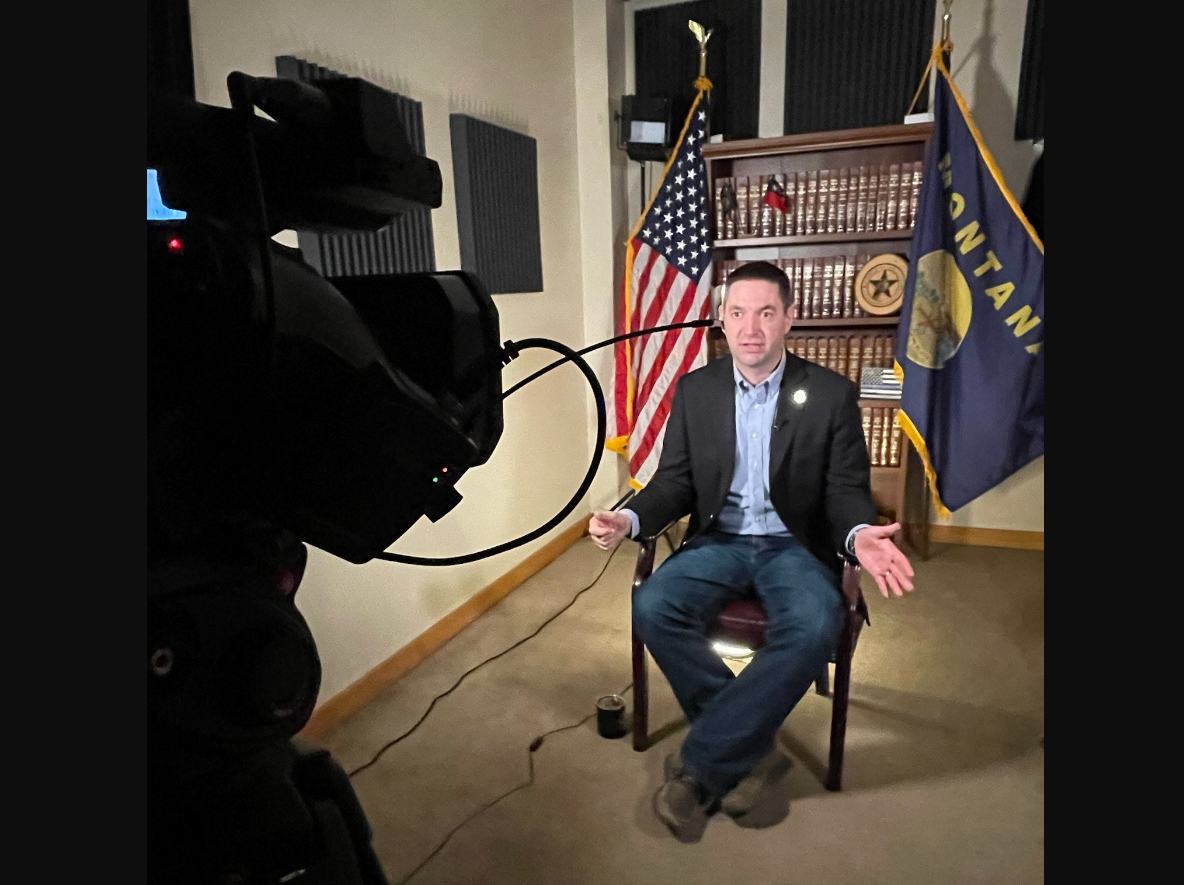
By Nicole Girten | HELENA, Mont. – The Montana Department of Justice quietly adopted a new policy for changing gender markers on Montana driver’s licenses that would require transgender Montanans to provide an amended birth certificate, as opposed to only requiring a note from a doctor.
That’s according to a class action lawsuit filed by the ACLU of Montana on Thursday, which is asking the court to declare the new Motor Vehicle Division policy unconstitutional. The lawsuit targets a rule enacted by the state’s health department in 2022 which plaintiffs claim bans transgender applicants from changing the sex marker on their birth certificate.
This lawsuit follows other legal challenges in recent years involving legislation and rules regarding changing gender markers on birth certificates in the Treasure State. A law passed during the 2021 legislature restricting changes to birth certificates was found unconstitutional and there are two other ongoing lawsuits surrounding a 2023 law defining sex as binary in statute.
Defendants listed in the lawsuit include Attorney General Austin Knudsen, the Montana DOJ, Gov. Greg Gianforte, the Department of Public Health and Human Services and DPHHS Director Charlie Brereton.
A spokesperson for Gov. Gianforte said Thursday the governor “stands by the bill he signed in 2023 that brings the long-recognized, commonsense, immutable biologically-based definition of sex — male and female — into our state laws.”
“It is no surprise the ACLU would wade into Montana to challenge commonsense, immutable biological facts to advance its far left agenda,” the spokesperson said in an emailed statement.
A DPHHS spokesperson said the department does not generally comment on on-going litigation and a spokesperson for the DOJ did not respond to emailed questions in time for publication.
Plaintiffs include a former Montana resident and transgender woman, Jessica Kalarchik, who is looking to change the gender marker on her birth certificate, and Jane Doe, a transgender woman looking to change the gender marker on both her birth certificate and her driver’s license.
Plaintiffs claim the 2022 rule, the 2023 law and the new DMV protocol go against protections in Montana’s constitution.
Plaintiff Doe avoids using public restrooms and changing rooms for fear of mistreatment or violence. She’s already faced mistreatment from people in her life after coming out, according to the lawsuit.
Doe worries about showing her identification documents with her gender assigned at birth to someone who may react negatively.
“Ms. Doe is typically perceived as female, so anytime she is forced to present an identity document that incorrectly identifies her as male, she is forced to ‘out’ herself as transgender,” the lawsuit read. “As Ms. Doe’s appearance has shifted, her driver’s license no longer matches her appearance, and she has experienced increasing issues with this disparity.”
Kalarchik, 49, is a transgender woman and veteran who was born in Butte and currently lives in Anchorage, Alaska, with her wife, Renee. She’s looking to have the gender marker amended on her birth certificate for similar fears of retaliation as Doe. The lawsuit said she has previously experienced incidents of harassment and discrimination in both her personal and professional life.
Kalarchik started hormone therapy in 2022 and has legally changed her name and sex marker on both her Alaska driver’s license and her Social Security card.
The lawsuit said the 2022 rule and Senate Bill 458, which defines sex as binary and passed in 2023, prevent Kalarchik from changing the gender marker on her birth certificate.
DPHHS announced in February the department was reinstating the 2022 rule, which only allows changes to birth certificates in the event the gender marker was listed incorrectly as a result of a data entry error and does not authorize changes “based on gender transition, gender identity, or change of gender.”
“The effect of the 2022 Rule is to categorically ban transgender applicants from obtaining birth-certificate amendments to reflect the sex they know themselves to be,” the lawsuit said.
The rule was first enacted as the state was in ongoing litigation surrounding a similar law passed in 2021, Senate Bill 280, which restricted transgender Montanans’ ability to amend the gender markers on their birth certificates.
The court temporarily blocked SB 280 in 2022, and the state needed to re-institute the previous process for changing birth certificates as litigation continued – which only required an applicant to submit a supporting affidavit. But the state did not, and instead passed the 2022 rule. The court found the state in contempt for going against the preliminary injunction and also found SB 280 to be unconstitutional.
In February, DPHHS said the 2022 rule aligns with SB 458, the sex definition bill sponsored by Sen. Carl Glimm, R-Kila, who also sponsored SB 280. There are two open lawsuits against SB 458. Brereton said in the February announcement DPHHS “must follow the law, and our agency will consequently process requests to amend sex markers on birth certificates under our 2022 final rule.”
Plaintiffs are claiming the 2022 Rule, the new MVD policy, and SB 458 (within the context of amending birth certificates and driver’s licenses) are not constitutional. The lawsuit argues the policies violate protections in the Montana constitution for privacy, equal protection under the law, and against compelled speech.
The lawsuit says the policies are inherently discriminatory and require compelled speech in that in order to comply, transgender people have to “misidentify themselves by a sex designation that does not accurately state their sex.”
The filing said the “essential danger” of these policies are they “require transgender Montanans to carry identity documents that are contrary to the sex they know themselves to be” and therefore increase risk of potential discrimination or violence.
Plaintiffs are asking to establish a class that would include all transgender people born in Montana who currently or in the future wish to change the gender marker on their birth certificate or driver’s license.
Postscript
After publication, the Montana Department of Justice reached out to the Daily Montanan to say the Motor Vehicle Division’s policy to change a sex marker has not changed.
******************************************************************************************

Nicole Girten is a reporter for the Daily Montanan. She previously worked at the Great Falls Tribune as a government watchdog reporter. She holds a degree from Florida State University and a Master of Science from the Medill School of Journalism at Northwestern University.
******************************************************************************************
The preceding piece was previously published by the Daily Montanan and is republished with permission.
The Daily Montanan is a nonprofit, nonpartisan source for trusted news, commentary and insight into statewide policy and politics beneath the Big Sky.
We’re part of States Newsroom, the nation’s largest state-focused nonprofit news organization.
Federal Government
Lambda Legal praises Biden admin’s finalized Title IX regulations
The new policy also reverses some Trump-era Title IX rules governing how schools must respond to sexual harassment & sexual assault
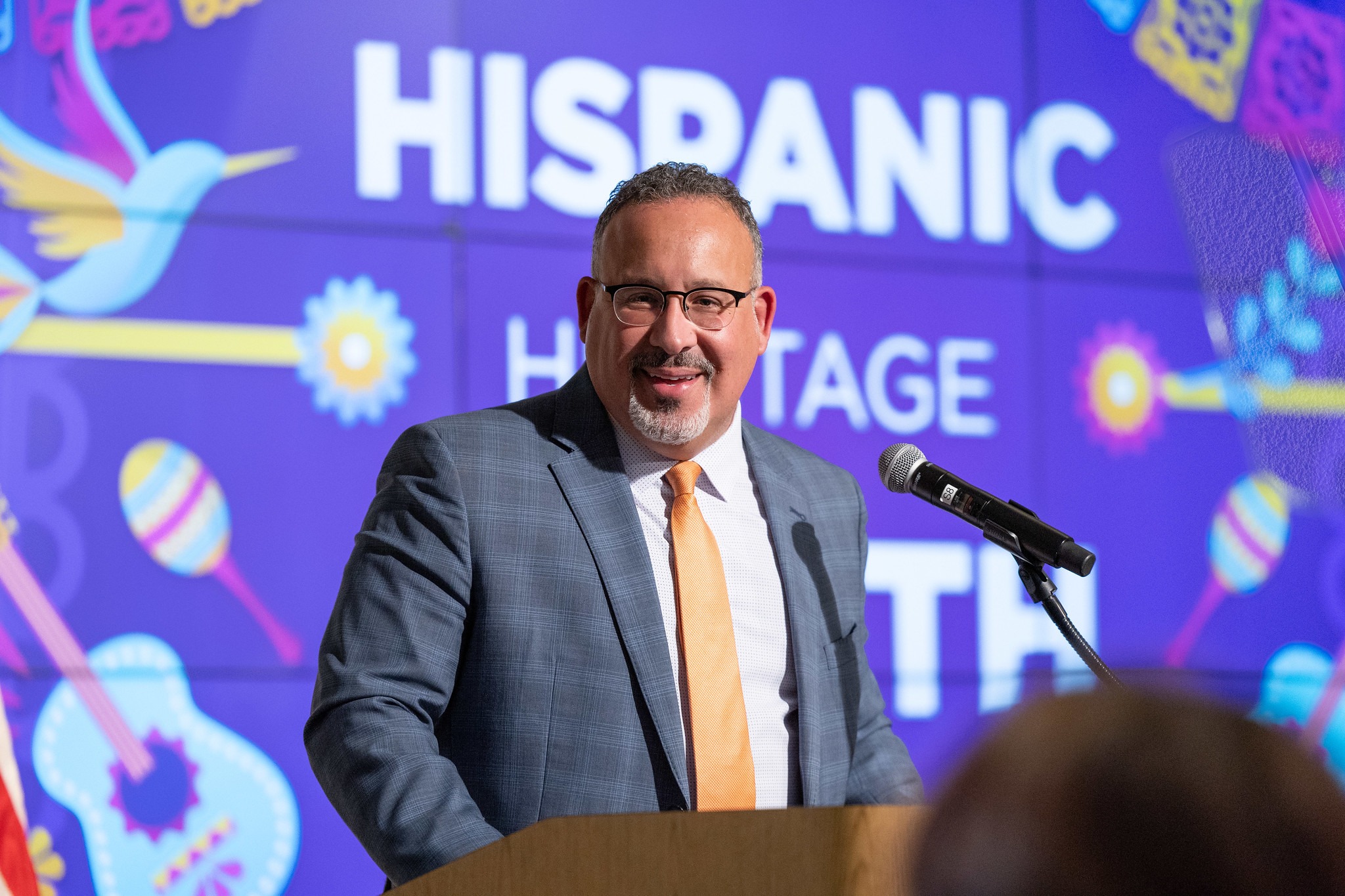
WASHINGTON – The Biden-Harris administration’s revised Title IX policy “protects LGBTQ+ students from discrimination and other abuse,” Lambda Legal said in a statement praising the U.S. Department of Education’s issuance of the final rule on Friday.
Slated to take effect on Aug. 1, the new regulations constitute an expansion of the 1972 Title IX civil rights law, which prohibits sex-based discrimination in education programs that receive federal funding.
Pursuant to the U.S. Supreme Court’s ruling in the landmark 2020 Bostock v. Clayton County case, the department’s revised policy clarifies that discrimination on the basis of sexual orientation and gender identity constitutes sex-based discrimination as defined under the law.
“These regulations make it crystal clear that everyone can access schools that are safe, welcoming and that respect their rights,” Education Secretary Miguel Cardona said during a call with reporters on Thursday.
While the new rule does not provide guidance on whether schools must allow transgender students to play on sports teams corresponding with their gender identity to comply with Title IX, the question is addressed in a separate rule proposed by the agency in April.
The administration’s new policy also reverses some Trump-era Title IX rules governing how schools must respond to reports of sexual harassment and sexual assault, which were widely seen as imbalanced in favor of the accused.
Jennifer Klein, the director of the White House Gender Policy Council, said during Thursday’s call that the department sought to strike a balance with respect to these issues, “reaffirming our longstanding commitment to fundamental fairness.”
“We applaud the Biden administration’s action to rescind the legally unsound, cruel, and dangerous sexual harassment and assault rule of the previous administration,” Lambda Legal Nonbinary and Transgender Rights Project Director Sasha Buchert said in the group’s statement on Friday.
“Today’s rule instead appropriately underscores that Title IX’s civil rights protections clearly cover LGBTQ+ students, as well as survivors and pregnant and parenting students across race and gender identity,” she said. “Schools must be places where students can learn and thrive free of harassment, discrimination, and other abuse.”
Rep. Mark Takano (D-Calif.), a Congressional leader on LGBTQ and education issues, also hailed the finalized rule on Title IX from the Biden Administration:
The Education Department and Biden Administration showed real courage today, delivering on a long-held promise to ensure that the federal government does more to protect all Americans—especially LGBTQ Americans—from discrimination.
This groundbreaking rule is a major victory, but we still have much to do. We need to enshrine and expand its protections by passing the Equality Act because for too many Americans, their rights and protections depend on the zip code they live in.
Arkansas
Another wound that will never heal; another tragic teen’s death
“Let Ethan’s legacy serve as a beacon of hope and a call to action for a more inclusive and accepting future”

LOS ANGELES, Calif. – The pain was palpable as it radiated from the grief stricken single mother who lost her only child- her beloved son, to suicide this past Sunday as she spoke in the phone call Thursday evening with the Blade.
Ethan was only 15 in fact he had just celebrated his birthday this past month.
Ethan was a bright and compassionate teenager, quick to help his elderly neighbors with lawncare, carrying in the groceries, or just sitting out on their porches listening to them tell stories or chat. “He was such a good boy, so loving, so caring,” his mother said.
Growing up in a small rural community in Arkansas, Ethan loved to hunt, fish, and spend time with Dad and he was a dutiful son to his mother, but that all changed a year ago when Ethan told his parents his truth- he was gay.
His mother was good with it she says, “His Dad left us, just walked away from him. No contact, silence.” His father’s rejection and abandonment left Ethan feeling guilt and despair, struggling to cope with the fallout of his father’s departure and the financial burdens placed on his now single mother.
She explained: “He began to withdraw and late at night he started to hurt himself even to the point to go to the E.R.” Adding to Ethan’s stress “the local farm boys would say hateful things, they’d call him faggot, they’d stay away telling him he was gonna give them AIDS or die from it.,” she said. The rejection and bullying got so bad at the school that staff stepped in and put an end to it. “The school was so supportive, they even gave in-school suspensions, but then those boys, others, went on line and it got worse,” she told the Blade.
Like most teens Ethan kept much of his pain to himself as his despair over loss of the relationship with his father, worry over his single Mom and money as she works in food service and money is scare became too much. “He was fine on Saturday- I mean it was a good day I didn’t see any problems,” she related to the Blade. On Sunday, he was gone- forever.
Now his mother is left with memories and questions that will never be answered. For now, his mother, Connie, asks for privacy during this difficult time as she grapples with the devastating loss of her only child.
After being contacted, Indianapolis-based Rainbow Youth Project USA has stepped in to support Ethan’s grieving mother, providing grief counseling services and assisting with final arrangements.
“In the face of adversity, it is crucial for communities to come together to support LGBTQ+ individuals and their families. Hate and intolerance have no place in a society that values love and acceptance for all. By honoring Ethan’s memory and advocating for inclusivity, we must strive to create a world where every individual is celebrated for who they are,” said Lance Preston CEO and Founder of Rainbow Youth to the Blade.
“As Connie navigates this overwhelming grief and loss, let us stand united in compassion and solidarity, offering our support and understanding. Let Ethan’s legacy serve as a beacon of hope and a call to action for a more inclusive and accepting future,” Preston added.
Editor’s Note: In consideration of preserving her privacy the Blade has not published Connie’s surname nor her residence’s location in Arkansas.
If you are in a life-threatening situation, please dial 911.
If you are in crisis, please dial 988 or contact Rainbow Youth Project directly at +1 (317) 643-4888

Would you like to help our efforts? Here are a few ways you can help: (Link)
-

 Political commentary & analysis4 days ago
Political commentary & analysis4 days agoAnti-trans British pediatrician backpedals on her review on HRT
-

 West Hollywood5 days ago
West Hollywood5 days agoBouncer at Heart WeHo arrested in brutal beating of gay stylist
-

 Celebrity News3 days ago
Celebrity News3 days agoJodie Foster honored at TCL’s Chinese Theatre handprint event
-

 Texas3 days ago
Texas3 days agoTexas Governor Abbott: “We Want To End” trans teachers
-

 Editor's Letter3 days ago
Editor's Letter3 days agoRemembering Columbine 25 years later, a reporter’s tale
-

 Riverside County4 days ago
Riverside County4 days agoMurrieta Valley School Board votes to defy state over trans policy
-

 Books4 days ago
Books4 days agoRob Anderson knows you think he’s annoying
-

 North Carolina2 days ago
North Carolina2 days agoRaleigh N.C. Moms for Liberty panel touts anti-LGBTQ+ agenda
-

 Research/Study4 days ago
Research/Study4 days agoSame-sex couples vulnerable to negative effects of climate change
-

 Books4 days ago
Books4 days agoOut CBS reporter Jon Vigliotti recounts covering a warming planet

